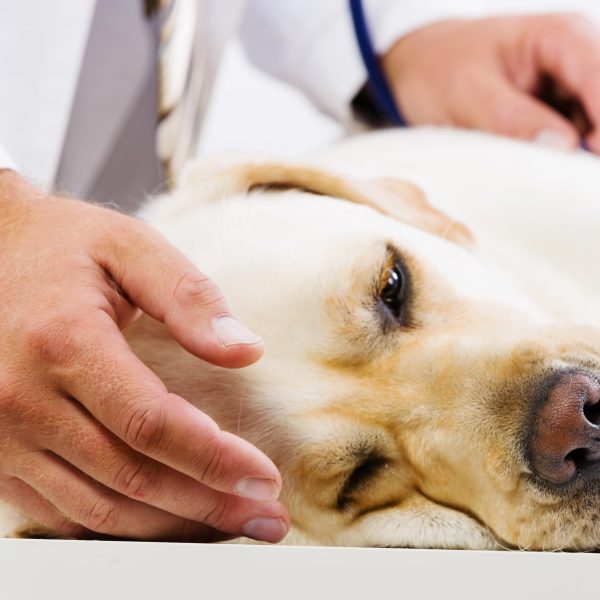What to Do If Your Dog Eats Chicken Bones

Sometimes, dogs eat things they shouldn’t. Accidents happen so it’s important to be prepared! Most dogs love chicken and may try their best to reach for any chicken bones they smell left on your kitchen table or counters. Here’s what to do if your dog eats chicken bones:
Can Dogs Eat Chicken Bones?
No. While dogs can eat plain cooked chicken, they cannot eat chicken bones. Chicken bones not only are choking hazards but can cause other problems throughout the dog’s digestive system.
What Happens If a Dog Eats a Chicken Bone?
Chicken bones can also splinter and break, which can cause damage to their mouth, esophagus, and intestinal tract. Eating a chicken bone can be painful for your dog. The bones can scrape or puncture your dog’s digestive system, causing serious injury or even death.
If the bones are not cooked, your dog may become sick with salmonella. Salmonella can cause vomiting and diarrhea and this may lead to dehydration. Diarrhea, vomiting, bloody stool, lethargy, and decreased appetite are all signs and symptoms you should never ignore in your dog. If your dog has ingested chicken bones, you should contact your veterinarian immediately.
What to Do If Your Dog Eats Chicken Bones
If you discover that your dog has eaten a chicken bone, there are a few steps to take:
1. Stay Calm
Your first instinct might be to panic if you find out your dog has eaten a chicken bone. However, it’s really important to stay calm. Dogs can sense emotions and if they sense panic, they might start to feel anxious too.
If you have caught your dog in the act of eating a chicken bone, stay calm and try to take any leftover bones away from them. Remember, dogs sometimes exhibit resource guarding when it comes to their food so try to do this as calmly as possible.
If they’ve eaten all the bones, again, try not to panic. Panicking can confuse your dog and may cause you to do something irrational or drastic. Try to assess if your dog is choking. If they seem to be breathing fine, take a minute to calm down and then give your veterinarian a call. They will be able to walk you through the different scenarios and give you signs to watch out for.
2. Keep an Eye on Your Dog
It’s important to keep an eye on your dog after they’ve ingested chicken bones. Just because chicken bones may splinter, doesn’t mean they will. Make sure you are in contact with your veterinarian so they can give you a list of signs and symptoms of blockage to look for.
Some signs and symptoms your veterinarian may tell you to look out for can include lethargy, straining when trying to use the bathroom, vomiting, a bloated abdomen, and bloody stool. You may also notice a lack of appetite or a general sign of discomfort in your dog. If you notice any of these signs and symptoms, you should seek medical attention right away.
You also should check your dog’s stool every day to see if they have passed the chicken bones. If you don’t see them within 72 hours or whatever timeframe your veterinarian has specified, you should see your veterinarian. This way, they can check to make sure the bones are not stuck in your dog’s throat or esophagus.
3. Learn From the Experience
Of course, accidents happen. However, you can learn from the experience and work to prevent it from happening in the future.
Identify Preventative Measures
Try to assess how your dog was able to get the chicken bones. Were they left somewhere they could easily reach? Did they take them out of the trash? Once you figure out how they were able to get to the chicken bones, implement preventative measures to avoid future problems.
Secure the Trash
Always make sure your trash is secured so your dog cannot get into it. Not only can they find things like chicken bones and other things they shouldn’t eat, but they can just make a general mess.
Clean Up Scraps Immediately
If they took them off the kitchen counter or a table, be sure chicken bones are never left unattended. Make sure they are thrown away and are secure so your dog is not tempted and cannot reach them.
Do Some Extra Training
Also, work on training so your dog learns not to steal food off of your table or the kitchen counter. Using positive reinforcement, one of the different types of dog training methods can be effective in helping your dog learn not to steal food.
Keep Them Out of the Kitchen
Depending on your dog and how food-motivated they are, it may be difficult to teach them not to grab things in the kitchen when your back is turned. If this is the case or it’s just too much to handle everything in the kitchen and monitor your dog, you can keep them out of the kitchen when you are prepping food.
A gate at the entrance plus some training can keep them out of the kitchen while still allowing them to be nearby. For some dogs, it’s better to corral them in another room or crate them during meal prep. Keeping them out of the kitchen can be the best solution for some dogs, especially if it’s not the first time they have gotten chicken bones.
This is just an overview of what to do if your dog eats chicken bones. Remember to stay calm and keep an eye on your dog for any signs of distress. Don’t be afraid to call your veterinarian. They can help you figure out the best course of action to take.
